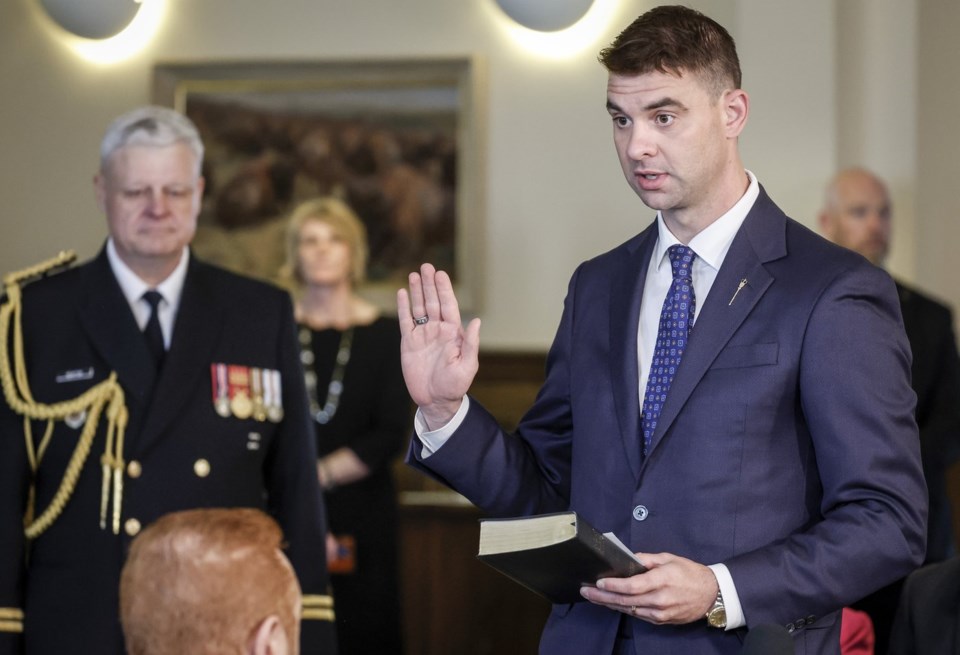CALGARY — This year, municipal candidates in Calgary and Edmonton face a decision they've never had to make: whether to join a political party.
But the choice represents more than the embrace or rejection of a new political system. It's a decision that will affect the flow of money into their campaigns.
In addition to the introduction of municipal parties this year in Edmonton and Calgary, new campaign finance rules in Alberta will advantage candidates running as a party -- but many mayoral candidates are choosing to reject the party system and run independently, even though it puts them at a financial disadvantage.
"For me, it's a matter of right or wrong. Just because something is legal doesn't mean you should do it," said Jeromy Farkas, a former Calgary city councillor running for mayor as an independent.
This year, donors in Calgary and Edmonton can contribute up to $5,000 to one candidate or cumulatively spend that much on numerous candidates. Previous rules allowed Albertans to donate up to $5,000 per candidate.
Donors also have the option of contributing an additional $5,000 to registered political parties, meaning $5,000 can be contributed to a candidate and another $5,000 to that candidate's party.
Corporate and union donations have also been reintroduced to municipal elections, which similarly have a $5,000 aggregate spending limit for individual candidates and parties.
The new rules are viewed by many to favour parties and their candidates. Parties also have the latitude to spend donations on any of their candidates, meaning extra resources are available to party candidates seeking a boost.
Dan Williams, Alberta's municipal affairs minister, said in a statement to The Canadian Press that parties need capital to operate and the rules align with those for provincial parties.
"The introduction of local political parties was never about having more candidates run under parties than as independents, or about parties and party-associated candidates being able to fundraise more than independent candidates," Williams wrote.
Sonya Sharp, running for Calgary mayor with the Communities First party, said the candidates work as a group to decide where party money is spent.
"Let's say one of the candidates needs some extra money for lawn signs. We decide as a team and we say, 'OK, how much money has been coming in and can we allocate, you know, $5,000 to this candidate because they're a little bit short?'"
Despite the incentives, several high-profile candidates in Calgary and Edmonton are running solo. Independent candidates interviewed said they were motivated to reject creating a party because of their distaste for the negative partisanship they believe political organizations foster.
Jyoti Gondek, who's running for re-election as Calgary's mayor, said in an interview that the party system is "the kiss of death for local representation" and has rejected the opportunity to align herself with an organization.
"Fundraising is important, but being out in the community is the most important thing," Gondek said.
Andrew Knack, an Edmonton councillor running for mayor, said he doesn't want to be beholden to voting across party lines, adding that he doesn't think it's necessary in city politics.
"If people don't want (the party system), we should be willing to reject the extra money," Knack said. "Some people chose to do it, and the only reason they're doing it is financial."
Party candidates see it another way. Tim Cartmell, a sitting Edmonton councillor running for mayor under the Better Edmonton party banner, argued that presenting a "team approach" will allow the city to more easily deliver change.
And the extra fundraising capacity is an obvious advantage, he said.
"It's a giant marketing exercise ... you're not going anywhere without name recognition," Cartmell said.
"It's not like anybody that chose to not run with a party didn't have that option available to them."
Stephen Carter, president of Decide Campaigns and who is working with the Calgary Party and Cartmell's Better Edmonton party, said he believes there's a strong correlation between electoral success and fundraising. Operating in a party system makes that easier, he said.
"You have two forms of fundraising instead of one form of fundraising," he said.
As to whether independents' vocal resistance to the party system will appeal to voters, Carter argued that message won't cut through to them.
"No one wanted this -- who cares? It doesn't matter what people want. What matters is the system that's available," Carter said.
Duane Bratt, a political science professor at Mount Royal University in Calgary, said the jury is still out on what effect the new finance rules will have on the final result.
"I don't know if we're really going to understand the impact of this until it's all over."
Municipal election day in Alberta is on Oct. 20.
This report by The Canadian Press was first published Aug. 25, 2025.
Matthew Scace, The Canadian Press



